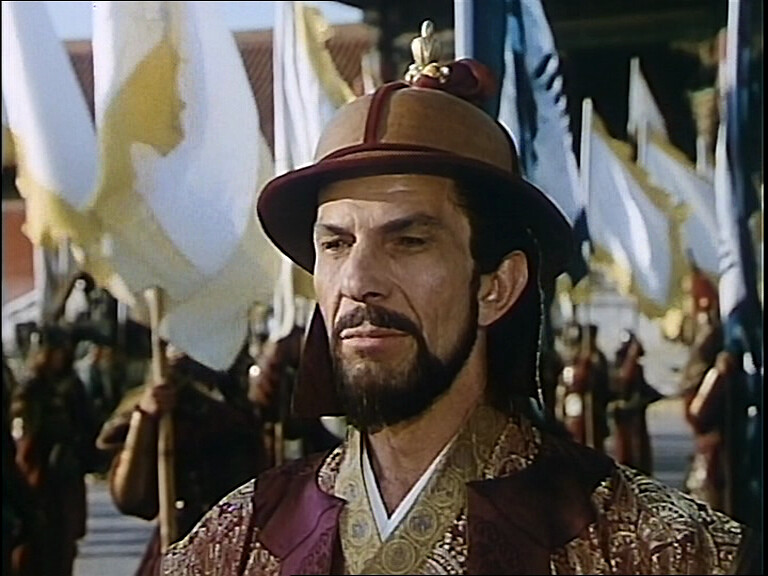Marco Polo (1982)
Summary:
The year is 1275 and China is divided into two realms. The north is ruled by Kublai Khan, descendent of Genghis Khan, the south by an emperor from the Sung dynasty. Kublai Khan intends to unify them again under his reign. A bloody war is pending. Marco Polo, who impresses the great Khan with his quick mind, geographical knowledge and capacity for remembering details, is invited to enter into service with him.
The Mongolian rulers distrust the Chinese deeply, which is why all important posts are held by either Mongolians or trusted foreigners. Achmet (Leonard Nimoy) is the most powerful among them. He represents the Khan when he is not in residence in the empire's capital, Khan Balic. He is a Turk, very capable and efficient, and attentive to the Khan's every wish.
While the Khan spents time at his summer residence, the war over dominance over all of China has been fought and won. Upon his return to Khan Balic, Achmet meets him to report the favorable news. China is united once again.
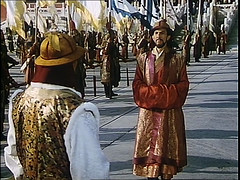
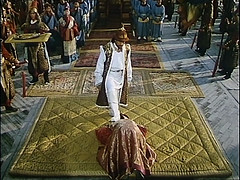
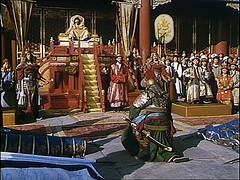
Marco's father and uncle, who have been building a reputation at the Khan's court for themselves as merchants and advisors, introduce him to Achmet once the formalities have been seen to. After the south has been conquered, Achmet sees markets and resources opening up for the taking and can make use of a bright young man with a background in business affairs. As he has been told, Marco earned the Khan's respect because he had the courage to tell him he was wrong. He warns Marco, though, not to rely on the Khan's lenience too often. Noble heads have been rolling for far less in the past. In case he would find himself in need of advice or help, Marco should not hesitate to come to him first, he instructs Polo.
Spurned by the recent victory, Achmet doubts that peace will last long before the Khan will discuss new conquests and indeed soon an opportunity presents itself. The Korean King suggests an allegiance to bring down Japan. Since he has a bone to pick with Japan, the Khan is all ears. The Mongolian nobles shy away from the thought of fighting a war at sea and argue strongly against the endeavor. If a place can't be reached on horseback, they agree, one is better served not to try. Achmet reminds them of the problems the empire is facing: flooding, epidemics in the north and famine and war damage in the south. They need money and Japan has plenty of gold.
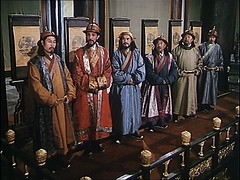 Marco speaks up at the council. He and the Khan's son Chinkin, whom he befriends, had witnessed a prophecy by astrologers that cautioned against just that event. Even the stars would be set against the war. But the Khan silences all misgivings. Marco's interference, though, amounts to him being sent away from the court for a while because his influence on the crown prince is deemed inappropriate. The Khan
Marco speaks up at the council. He and the Khan's son Chinkin, whom he befriends, had witnessed a prophecy by astrologers that cautioned against just that event. Even the stars would be set against the war. But the Khan silences all misgivings. Marco's interference, though, amounts to him being sent away from the court for a while because his influence on the crown prince is deemed inappropriate. The Khan 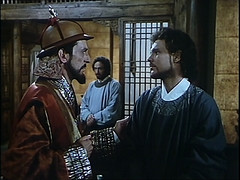 wants him sent to the north but Achmet suggest he wouldbe of better use in the south. He wants to avail himself of Marco's keen power of observation that the Khan values so highly. Marco is appointed to travel with his tax collectors to draw up a tax census for the newly conquered region. The treasury needs a refill and they're in need of payments from every source possible.
wants him sent to the north but Achmet suggest he wouldbe of better use in the south. He wants to avail himself of Marco's keen power of observation that the Khan values so highly. Marco is appointed to travel with his tax collectors to draw up a tax census for the newly conquered region. The treasury needs a refill and they're in need of payments from every source possible.
It is at this point that Marco realizes the downside and basic injustice of feudalism. He befriends a peasant family in the rural area he's set up camp in and is faced with the pain and anguish the family experiences when their daughter is kidnapped by soldiers and their village burnt down because the inhabitants are accused of hiding insurgents protesting the unjust taxes and foreign rule. Upset, Marco returns to Khan Balic and asks Achmet to help the poor woman's father find his daughter who has been abducted most probably to vanish as a concubine or prostitute behind the walls of the capital. Achmet flatly refuses, citing the enormous task at hand and the need to respect the customs of the locals, even if they're not agreeable. This angers Marco even more, but he accepts that in this case he's run out of options.
A bell ends the audience, calling the council into session. There news of the Chinese/Korean fleet being sunk in a massive storm, as was prophesied, are announced. Later, back in his residence, Achmet inspects the "gifts" from the province in the south sent by the local tax supervisor. Among them is the daughter of Marco's friend, who in his village was known as "the Poet." What exactly happens next, the camera keeps quiet about, but the woman later is found hanging from a beam at Achmet's residence. Meanwhile, Achmet is informed by his servant that his presence is wanted in the throne room. Upon arrival Achmet too late realizes he's been lured into a trap. He dies from multiple stab wounds.
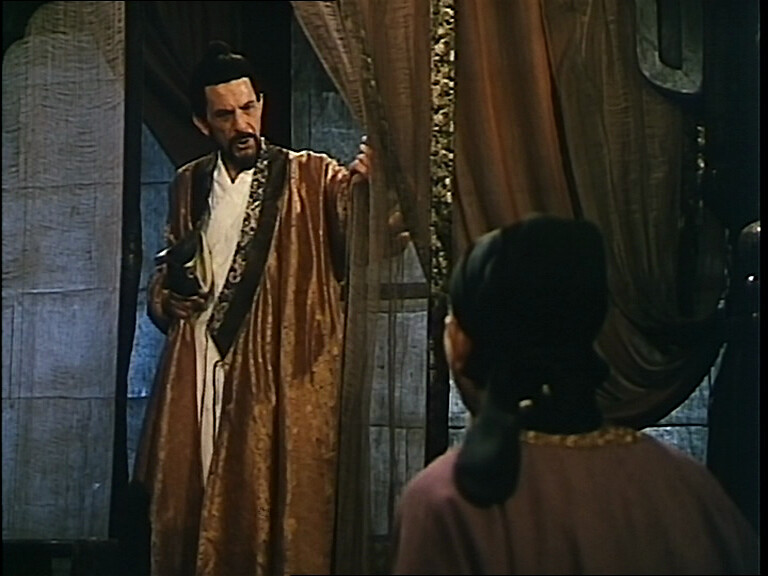
More screenshots and other pictures are here, and for those still left wishing for more, all 379 screenshots can be downloaded here. (Sorry, the last download is not available at the moment.)
Review
In 1983 almost everybody I knew was watching that years Christmas special on TV. It was a year before private broadcasters were allowed on the air. All we had were three programs and that year the Christmas special in four parts the ARD showed was Marco Polo. (In case anyone wonders about the date, it took time to dub the series into German and that is why we saw it in '83) I don't remember if I watched it because it was that year's special on TV, or because Mr. Nimoy had a part in it, which I find really amazing. Usually that is a reason to remember! Maybe it was because I enjoyed the series on it's own merits back then and it didn't matter that much whether my favorite actor had a small part in it. I got nostalgic this year and started out summarizing only the parts Mr. Nimoy appeared in, since I wasn't planning on rewatching the entire series over Christmas, only to finish it out after all.
In the extras on the DVD the director of Marco Polo discusses what influenced his choice of actors a bit. The interview was conducted in Italian, there were no English subtitles, so I'm translating this from the German ones.
I set great store by the character of the people who would be with me all the way through our travels. For the smaller parts, I was open to suggestions...and because most of the financial support came from the U.S...from Procter & Gamble, NBC, big business companies. Thus, when one asks, "What do you think of Anne Bancroft?" what should I say? That I can't wait to meet her. And, indeed, it was a lovely meeting, even though it lasted only a few days. "What do you think of Leonard Nimoy?" I knew him from Star Trek and knew he was an excellent actor. Upon his arrival he was glad to loose his Star Trek ears for a while...and do what he's really good at, namely, play his part. So much about Leonard Nimoy.

